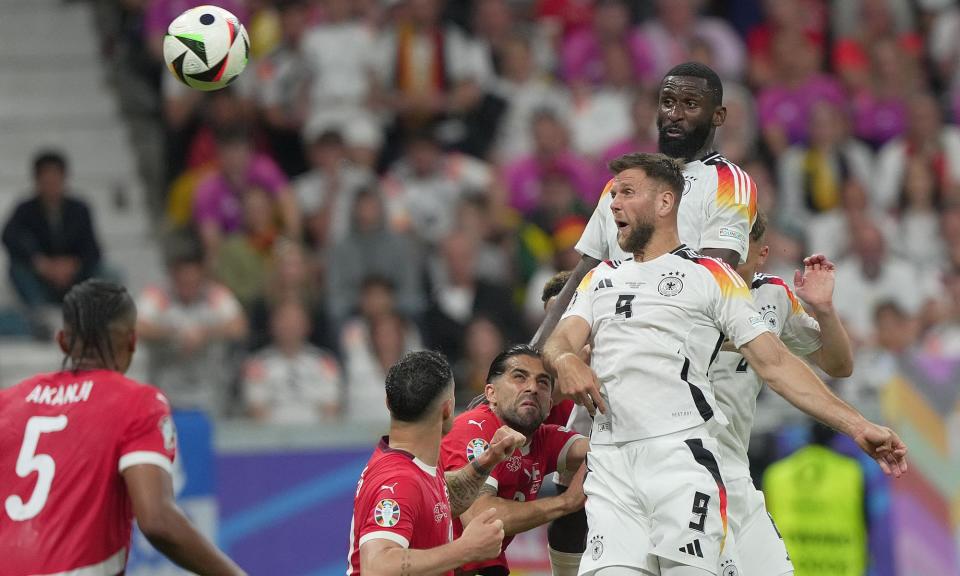Germany relieved to qualify top after Füllkrug denies Switzerland at the last

It was a humbler and wiser Germany that stepped from the turf here at full-time: euphoric after Niclas Füllkrug’s injury-time header, relieved at topping the group, but with perhaps a more realistic idea of where they are and what to expect from them. Like one of its mercurial intercity trains, Germany’s Euro 2024 journey stuttered and slowed here, even threatening an unscheduled diversion, but ultimately remaining raggedly on course.
And so in a way this was a kind of hazing: a stress test under laboratory conditions, with qualification already secure but a number of flaws that required the scrutiny of a strong Swiss side to expose. How would this team – which until recently was actually very bad – deal with its first big setback, its first indifferent crowd? How would that defence hold up against a team unafraid to run at them? And what happens if you really, really need a goal in the 91st minute?
The stats will show that Germany dominated possession 66%-34% and by 18 shots to four. In reality it was a far more even game than that, with Switzerland having a goal disallowed for offside and Granit Xhaka almost sealing the points late on with a rasping shot from distance. Murat Yakin’s side were sensational: salty when they had to be, slippery on the break, taking the lead through Dan Ndoye and seeing their lead all the way through to 90 minutes.
And so this goal was worth more than one Group A point to Germany. It averted a last-16 tie at Berlin’s Olympiastadion against – probably – their nemesis Italy, with perhaps England, France and Spain to follow. More importantly, it maintains the pleasant vibes around what has thus far been a tournament of discovery and growth.
Related: Scotland heartbreak as Hungary’s 100th-minute winner knocks them out of Euro 2024
The yellow card to Jonathan Tah is a nuisance, putting him out of the next game, and there will be a certain anxiety at the ease with which Switzerland were able to slice them open. But the skittish, desperate energy they displayed in the closing minutes will be as encouraging in retrospect as it was infuriating at the time: proof that Germany have multiple attacking threats, personality to burn and the sort of unstoppable momentum that turns half-chances into golden opportunities.
Füllkrug epitomised this, coming off the bench and again – as he did at the Qatar World Cup – proving the difference-maker. He now has six major tournament appearances, all as a substitute, a total of 139 minutes that have produced four goals. “It’s good luck and bad luck for him that he’s so good in that role,” Julian Nagelsmann said. “Yes, he has a chance to start. But Kai [Havertz] also has that chance. It depends what we need during a certain phase of the match.”
For Switzerland, Xhaka deservedly took away the player-of-the-match award for a stirring and brilliant night’s work. Playing further forward than he normally does for Bundesliga champions Bayer Leverkusen, Xhaka was the game’s disruptive force, its unreliable narrator. He hounded Toni Kroos all night, and even if Germany’s talisman still enjoyed 127 touches he was unable to do his usual damage in dangerous areas. “After this game, I hope everyone has a little bit more respect for us,” Xhaka said afterwards.
And perhaps Germany did underestimate Switzerland a little: not their quality so much as their intensity, their willingness to commit to the physical battle. Certainly as Xhaka pounced on Kroos’s casual pass to steal the ball from Jamal Musiala, setting Switzerland on a four-on-four attack, there was little immediate alarm in the German defence, even as Remo Freuler took the ball into the left channel and tried a hopeful cross. Ndoye’s volley was satisfyingly perfect: slammed into the roof of the net, the first real moment of jeopardy for Sommermärchen 2.0.
Nagelsmann waited until the hour before deciding he had seen enough. The surgical Maximilian Mittelstädt was replaced by the surging David Raum at left-back. Off came Robert Andrich, who had been denied a scorching first international goal in the first half by a Musiala foul. Off came Musiala and Florian Wirtz. On went Füllkrug, the Hoffenheim striker Maximilian Beier and Leroy Sané: an all-out frontal assault of pace and power, with the front five pushing up and tucking in Switzerland’s back five like a hotel bedsheet.
Finally, after a Havertz header against the bar and a miraculous block by Manuel Akanji on Joshua Kimmich, and no end of alarms at the other end, Nagelsmann and Germany got their moment of jubilee. Raum crossed; Füllkrug rose highest. The Frankfurt Arena rose with him, and amid the deafening din was a kind of affirmation: proof – if ever it were doubted – that this is Germany’s time.
And it really was looking pretty hairy there for a while. Now Denmark, Serbia and Slovenia will hold no qualms for them; England would be spicy, but this is a good time to play them. Above all, Germany can go into the knockout stages with the satisfaction of having been tested. It may not have been the result they wanted. But it may just have been the night they needed.

